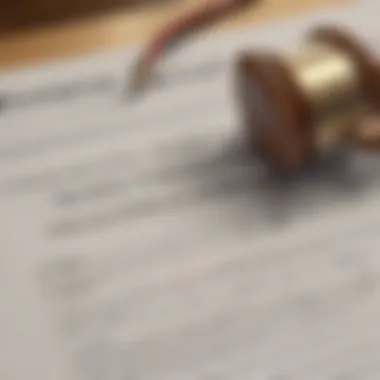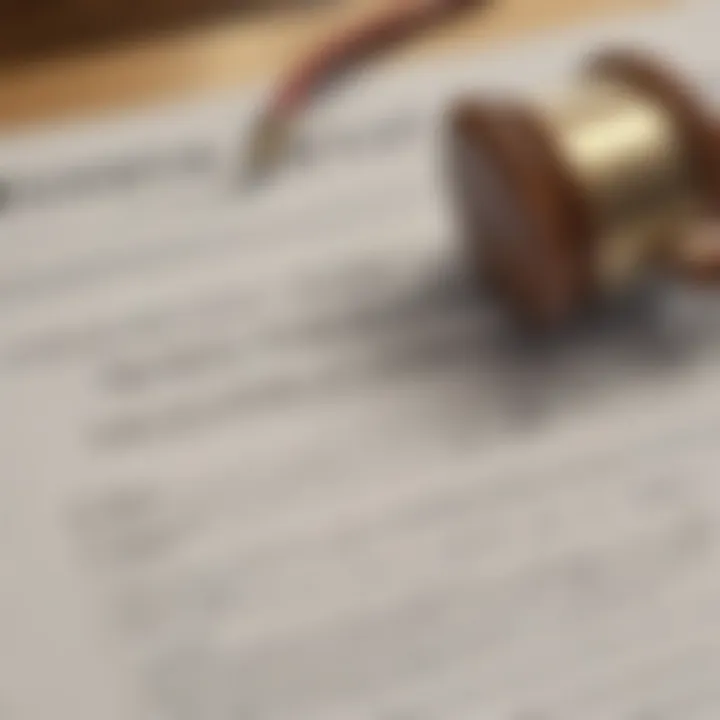A Comprehensive Guide to Limited Power of Attorney


Intro
When navigating the murky waters of legal documentation, the term limited power of attorney often crops up. It's one of those phrases that can sound more daunting than it truly is. At its core, this legal tool offers a way for one person, the principal, to give another, known as the agent, specific authority to act on their behalf in certain matters. But before diving headlong into the details, it’s important to grasp the context and significance of these forms.
This article will clarify what constitutes a limited power of attorney form, alongside when and why it might be utilized. We'll dissect the legal implications intertwined with its use, highlight the critical differences between limited and general powers of attorney, and unpack the steps necessary for creating these documents. Through this exploration, we aim to not just inform, but to empower readers—whether investors, financial advisors, or analysts—about the intricate, yet essential, elements of limited power of attorney forms.
The understanding of these forms is not merely academic; it has practical implications that can affect personal and business affairs alike. Let's begin our journey into this often underappreciated legal construct.
Intro to Limited Power of Attorney
Understanding the limited power of attorney (LPOA) is crucial for anyone involved in personal or business affairs that require legal delegation of authority. This document allows one individual, known as the principal, to appoint another individual, the agent, to act on their behalf for a specified purpose.
The beauty of this arrangement lies in its precision. With a limited power of attorney, the scope of authority is clearly defined. This reduces the risk of overreach, contrasting significantly with more general forms of power of attorney. In today’s fast-paced world, where decisions often need to be made swiftly but legitimately, having a clear understanding of this legal tool provides not just peace of mind, but also versatility in managing both personal and professional situations.
In contexts where one might be incapacitated or otherwise unavailable, an LPOA can provide a seamless bridge. It can be a temporary measure, granting specific powers for limited times, such as handling real estate transactions or managing finances during travel or recovery. Such specificity makes it an essential element of financial planning and legal strategy.
What Is a Limited Power of Attorney?
A limited power of attorney is a legal document that authorizes another individual to act on one's behalf in specific situations. This could be anything from selling a property, executing certain financial transactions, or making decisions related to specific businesses.
The principal enjoys the flexibility to grant powers while maintaining control over what those powers entail. For example, someone might choose to give their agent the authority to handle their tax filings but not their day-to-day finances. This compartmentalization is particularly useful in reducing potential conflicts and ensuring that the principal's wishes are followed accurately.
It’s important to note that LPOA shouldn't be confused with a blank check; the authorizations granted are specific and often delineated in the document. A well-prepared limited power of attorney should state precisely what actions the agent is allowed to take, affirming the principal's intention.
Distinction from General Power of Attorney
While both limited and general powers of attorney allow for the delegation of authority, they differ significantly in scope. A general power of attorney grants the agent broad powers to act on behalf of the principal in nearly any capacity. This includes financial matters, legal proceedings, and personal affairs.
In contrast, a limited power of attorney restricts the agent to specific tasks or timeframes. This distinction is paramount. For individuals seeking to maintain tighter control over specific aspects of their lives or businesses, an LPOA presents itself as a tailored solution.
To highlight these differences clearly:
- Scope of Authority: General POA has no restrictions; LPOA is task-specific.
- Duration: General POA may last indefinitely; LPOA can be temporary but is defined.
- Risks and Control: General POA holds higher risk of misuse; LPOA offers tighter control and mitigates the risk.
In every case, clarity is king. Choosing between a limited or general power of attorney should stem from clear understanding of needs and potential risks involved.
Understanding these definitions and differences lays the groundwork for more complex explorations of the legal framework, use cases, and procedures surrounding limited power of attorney forms.
Legal Framework for Power of Attorney
The legal framework governing powers of attorney forms, particularly the limited variety, is a cornerstone of ensuring that such documents are recognized and honored by legal entities. This framework sets the ground rules for the creation, execution, and enforcement of these documents, influencing how they function in both personal and professional landscapes. Understanding this legal underpinning is vital for anyone considering the use of a limited power of attorney, as it delineates the rights and responsibilities involved.
Effective use of a limited power of attorney mandates a clear understanding of state-specific laws and regulations, which can differ significantly. Thus, knowing the key elements can help avoid potential pitfalls.
State Laws Governing Powers of Attorney
Each state has specific statutes that dictate how powers of attorney must be executed, administered, and revoked. It's essential for individuals or businesses to consult these statutes to ensure compliance with local laws. Here are a few important aspects:
- Different Standards: The requirements for drafting and witnessing a limited power of attorney can vary. Some states might require notarization, while others may also need an additional witness.
- Statutory Forms: Some states provide statutory forms that fulfill legal requirements, simplifying the process for users. For example, California offers a prescribed form that, when filled out correctly, is sufficient for establishing a limited power of attorney.
- Validity Across State Lines: A power of attorney executed in one state may not be recognized in another. It is crucial to ensure that a limited power of attorney complies with the laws of the state where it will be utilized, especially if crossing state lines is a factor in its execution.
Being aware of these factors can safeguard against challenges in the validity of the document and ensure that the appointed agent can act without hitches.
Key Legal Terms and Definitions
In understanding the legal framework, demystifying some common terms and definitions surrounding limited powers of attorney can be particularly helpful:
- Principal: The individual who grants authority through the limited power of attorney. This person holds the decision-making power until it is delegated legally.
- Agent: Also known as an attorney-in-fact, this is the person who receives the authority to act on behalf of the principal. The agent can be a trusted friend, family member, or even an attorney.
- Durability: This term refers to whether the power of attorney survives incapacitation of the principal. If durability is included in the document, it means the agent can continue to act even if the principal becomes unable to make decisions.
- Scope: It refers to the specific powers granted to the agent, which can be narrow or broad depending on the principal's needs.
Clearly understanding these terms aids individuals in navigating the complex landscape of limited powers of attorney. With these clarifications in mind, anyone contemplating a limited power of attorney will be better equipped to make informed decisions about its use and implications.
Purpose and Use Cases


Understanding the purpose and use cases of a limited power of attorney forms is crucial for anyone navigating complex personal or business decisions. These documents allow one individual or entity to act on behalf of another for specific tasks or decisions, providing a safety net during times when the principal may be unavailable or unable to manage their affairs. The flexibility and focused authority that limited power of attorney offers can be beneficial in various scenarios, making them indispensable in many situations.
Common Scenarios for Limited Power of Attorney
Limited power of attorney comes into play in many everyday situations. Consider the case where someone needs to handle real estate transactions. For instance, if an individual is on a business trip and is about to close a real estate deal, they might grant a friend or business associate a limited power of attorney. This allows that person to sign documents and complete the transaction without waiting for the principal to return.
Another instance often seen is in healthcare situations. A person may designate a family member or close friend to make medical decisions when they are incapacitated. This ensures that healthcare choices align with the principal's wishes during critical moments when they cannot voice their preferences.
In summary, limited power of attorney grants authority just for defined tasks, making it a practical solution for various urgent or important situations.
Business Applications
In the business realm, limited power of attorney serves as a crucial instrument. Business owners or investors frequently use these forms to facilitate operations. For example, if a business owner is traveling overseas and has a vital transaction or decision to make, they might appoint a trusted manager to handle contract signings or negotiations. This not only ensures smooth operations but also reduces the risk of missing critical deadlines.
Another significant area is in business partnerships. By establishing a limited power of attorney, partners can designate specific responsibilities to one another without overstepping. One partner can be entrusted with handling financial reports or real estate investments while the other focuses on operational aspects. This division of labor allows each partner to leverage their strengths more effectively, optimizing the overall performance of the business.
Personal Management Situations
Limiting power of attorney isn’t confined to business matters; it has substantial applications in personal management as well. For example, someone might craft a limited power of attorney to authorize a trusted individual to manage their retirement accounts while they're preoccupied with other commitments.
Additionally, individuals who may face health uncertainties or wish to preempt future incapacity can set up limited power of attorney for one or more personal financial matters. This might include tasks like handling bill payments or managing investments, ensuring that their finances continue to operate smoothly, even if they're no longer able to oversee them personally.
In both corporate and personal contexts, limited power of attorney provides versatile solutions that respect individual preferences while enabling necessary actions to proceed.
In situations requiring immediate trust and authority, limited power of attorney bridges the gap between necessity and accessibility, allowing important matters to be attended to without delay.
Elements of a Limited Power of Attorney Form
A limited power of attorney form is more than just a piece of paper; it encapsulates the essence of trust and authority one person bestows upon another. Understanding the key elements of this form is crucial, especially for those who navigate the intricate waters of financial, personal, or business decisions. Each part of the form has a vital role, outlining not only who is empowered but also what actions they can take and for how long.
Identifying the Principal and Agent
The principal is the person granting the power, while the agent is the individual who receives it. Clearly identifying these parties is non-negotiable because it sets the stage for the entire agreement. Misidentifying either party can potentially lead to legal ambiguities that might complicate matters down the road.
For example, if John Smith is granting power to his son, Mark Smith, the form should explicitly list "John Smith" as the principal and "Mark Smith" as the agent. Clarity helps prevent disputes and ensures that the intent behind the powers granted is easily understood by all involved.
Scope of Authority Granted
The scope of authority adheres to the lifeblood of a limited power of attorney. This section details the specific powers granted to the agent. It’s akin to giving someone the keys to a car but only allowing them to drive it to specific destinations.
This might include:
- Managing bank accounts
- Making healthcare decisions
- Selling specific assets
Being precise in this area is essential; otherwise, the agent might overstep their boundaries, leading to potential misuse of authority. Each documented action can help sidestep misunderstandings or unintended consequences.
Duration of Power
Determining for how long the power of attorney will be valid is another critical element. This period can vary widely—it could range from a few hours during a business transaction to several years for ongoing management needs. The duration should be clearly specified on the form to avoid any confusion once the agreement goes into effect.
A common approach is to include phrases such as "until the completion of the transaction" or " effective until the principal revokes it in writing." This allows flexibility while establishing a clear end point for the agent’s authority.
Signature Requirements
Signature requirements ensure the document holds up in a court of law. This section outlines who needs to sign the form for it to be considered valid. Typically, both the principal and agent must sign the document. Depending on the jurisdiction, you may also need witnesses or notarization.
The importance of signatures cannot be understated. A missing signature or an improperly executed one can nullify the entire agreement. Keeping this detail in mind helps safeguard against future legal hurdles.
Witnesses and Notary Public
Lastly, many states require additional layers of verification, such as the presence of witnesses or a notary public. Adding these safeguards can bolster the legitimacy of the document.


Witnesses serve to corroborate that the principal was of sound mind and not under duress when signing, which is crucial for preventing potential challenges to the document later. A notary public adds an official layer of authenticity that can help mitigate any disputes.
Including witnesses or notarization often transforms a simple document into unassailable legal authority, so it’s worth considering in your drafting process.
In summary, the elements of a limited power of attorney form are designed to protect everyone involved. By focusing on these components, you create a transparent and effective document that not only meets legal requirements but also reflects the trust inherent in the relationship between the principal and the agent.
Drafting a Limited Power of Attorney Form
Drafting a Limited Power of Attorney (LPOA) form is not just a procedural step; it’s an essential process that demands careful thought and precision. These forms grant specific powers to an agent, making it crucial to encapsulate exactly what authority is bestowed and under what circumstances. A well-drafted LPOA can protect the interests of the principal while ensuring clarity and legal validity. This section will outline key considerations that come into play before drafting, and discuss whether to use templates or create a custom document.
Considerations Before Drafting
Before diving into the nuts and bolts of drafting, one must consider several factors that can greatly impact the efficacy of the document. These considerations include:
- Purpose of the Authority: What specific actions should the agent be permitted to perform? This could range from managing financial transactions to making medical decisions. Defining the scope sharply is paramount.
- Duration of Authority: Knowing whether this power is temporary or ongoing is vital. An LPOA can be set for a specific period or until a particular event occurs.
- State Laws: Each state has its own laws regarding LPOAs, so understanding the local legal framework is crucial. Failing to comply with state-specific requirements can nullify the document.
- Agent Qualifications: Choosing a trustworthy agent is essential as they will act on behalf of the principal. Assess their ability to handle the responsibilities assigned.
"Drafting a Limited Power of Attorney isn’t merely a formality; it’s about protecting your interests in the most precise terms possible."
These aspects create the groundwork for the LPOA form. Failure to address any one of them could lead to disputes or misinterpretations down the line.
Template vs. Custom Drafting
When it comes to drafting the LPOA, one might ponder whether to use a pre-made template or to create a custom document tailored to individual needs.
Template Advantages
Using a template can speed up the drafting process. Templates are often legally vetted and provide a general framework that is easy to follow. Here are some key advantages:
- Efficiency: Saves time; just fill in the blanks once you identify the specifics.
- Standardization: Maintains consistency with established legal norms, often eliminating the need for further legal advice.
- Cost-Effective: Generally less expensive as they don’t require extensive legal consultation.
However, simply plugging information into a template can sometimes be a double-edged sword. Templates may lack the nuance required for unique situations.
Custom Drafting Advantages
In contrast, a custom-drafted LPOA allows for incorporating all aspects of the principal's unique situation
- Precision: Each detail can be tailored to reflect the specific requirements.
- Flexibility: Potential to include clauses and stipulations that templates may overlook.
- Specificity: Reduces the risk of ambiguity, making your intentions crystal clear.
Deciding between using a template or drafting a custom form fundamentally comes down to the complexities of the situation at hand. For those with straightforward needs, a template might suffice. However, if the circumstances are convoluted, custom drafting is often the safer route.
Choosing wisely between these paths ensures that the LPOA serves its intended purpose effectively.
Executing the Limited Power of Attorney
Executing a limited power of attorney (LPOA) is a crucial step that can't be taken lightly. This process lays the foundation for authorizing someone else to act on your behalf in specified matters. The importance of this section lies in ensuring that the LPOA is executed correctly, which helps protect both the principal and the agent involved.
When done right, it streamlines transactions and decisions, especially when the principal cannot be present, making it essential for personal management or business dealings. However, a misstep in execution can lead to a cascade of negative consequences—from invalidating the document to complicating legal proceedings, affecting your financial interests in significant ways.
The steps you take here not only influence the effectiveness of the power you are granting but also determine the clarity of the authority being conveyed.
Steps to Execute the Document
Executing a limited power of attorney involves several clear steps. Each step is significant and serves a specific purpose in making sure the document is recognized and effective:
- Identify and Prepare: Gather the necessary information about the principal and the agent. This includes full legal names, addresses, and pertinent identification details. Make sure to prepare the form accurately by filling in the specific powers being granted.
- Sign the Document:
The principal must sign the LPOA in the presence of a witness or notary, as required by state laws. This is a critical step to ensure that the document holds legal weight. - Witnessing and Notarization:
Depending on local regulations, having a notary and witnesses can add additional layers of legitimacy. Notaries verify the identity of the signers and ensure that the signing is voluntary. - Distributing Copies:
After execution, it’s wise to distribute copies of the signed document to relevant parties, including the agent and any institutions which may need to rely on it, like banks or real estate agencies. - Store Safely:
Keep the original document in a safe place. Accessibility is key; however, it also needs to be secured against unauthorized access.
By adhering to these steps, the LPOA can be executed effectively, ensuring that the document serves its intended purpose without hiccups.
Common Errors to Avoid
While the execution process might seem straightforward, pitfalls lurk around every corner. Here are common errors that should be avoided:


- Incomplete Information:
Failing to properly fill in all required fields can render the LPOA ineffective. Be meticulous with details. - Forgetting Notary Wording:
Each state has unique notarial guidelines. Ignoring them can lead to rejection of the document. Make sure you check local laws. - Inadequate Witnessing:
Not having the required number of witnesses or not having them sign can invalidate the document. Ensure compliance. - Misunderstanding Scope:
If the powers granted are unclear or overly broad, it may lead to misuse or legal challenges later. Clearly define the authority being given. - Improperly Storing the Document:
Not organizing the signed document well can make it challenging to retrieve when needed. Always store in a secure, accessible spot.
"An ounce of prevention is worth a pound of cure." Rightly applied here, executing a limited power of attorney with care can save a mountain of trouble down the line.
Termination of Limited Power of Attorney
The termination of a limited power of attorney (LPOA) is a crucial aspect to understand, especially for investors, financial advisors, and analysts. It dictates how and when the authority granted to the agent ends, ensuring that both parties involved have clarity about the duration and limitations of that power. Recognizing how to properly terminate an LPOA helps in avoiding potential disputes or legal complications down the line, which can be particularly damaging in financial dealings where trust is paramount.
Knowing when and how termination can happen empowers both the principal and the agent, allowing for smoother transitions and easing anxieties surrounding the management of affairs. In business and personal contexts alike, having this knowledge can bolster the confidence of all parties involved.
Conditions Leading to Termination
Several conditions can lead to the termination of a limited power of attorney, each significant in its own right:
- Fulfillment of Purpose: When the specific task or purpose for which the LPOA was created is completed, this automatically brings about the termination of the agent's authority. For instance, if the agent was granted power to complete a real estate transaction, once that transaction is closed, the authority ceases.
- Revocation by Principal: The principal has the right to revoke the LPOA at any time, provided they are of sound mind. This is done through a formal revocation process, and taking this step signifies that the principal has decided to resume control over their affairs.
- Expiration of Duration: Many LPOAs include a specific duration. After this period expires, the power automatically terminates. For example, an agreement might specify that the power last only until a certain date.
- Change in Circumstances: Certain life events, such as death, bankruptcy, or legal incapacity of either the principal or agent, can lead to the termination of the power of attorney. Such changes significantly alter the dynamic and trust involved.
- Certification of Agent's Incompetence: If an agent is deemed legally incompetent to make decisions, the LPOA is null and void. This might occur due to mental incapacity or other legal determinations.
Understanding these conditions highlights the necessity for clear communication between the principal and the agent and can prevent misunderstandings from arising.
Revocation Process
Revoking a limited power of attorney is not merely a verbal declaration; it requires observance of specific steps to ensure that the process is legally recognized. These steps include:
- Written Revocation: The principal should draft a written revocation document that states the desire to cancel the LPOA. This document should clearly specify the original power of attorney being revoked and include identifying details such as the names of the principal and agent.
- Notification to Agent: The agent must be informed of the revocation. Sending the written revocation via certified mail is often advisable to provide proof of notification.
- Communicate with Third Parties: If the LPOA had been shared with any third parties, such as financial institutions, informing them about the revocation is essential. This step ensures that these parties no longer recognize the agent’s authority.
- Surrender Original Document: The principal should retrieve the original LPOA document from the agent, if possible. Destroying or marking the document as revoked can help avoid any future confusion.
- Legal Filing (if necessary): In some instances, and depending on state laws, it might be prudent to file the revocation with a court or local registry to make the revocation more official and public.
"A limited power of attorney remains a tool to empower someone while needing vigilance about its limitations and termination."
In sum, the termination of a limited power of attorney is a multifaceted subject that warrants careful consideration. Understanding the conditions that lead to its termination and masterfully navigating the revocation process can provide a necessary safeguard, ensuring that authority is only in the hands of those the principal truly trusts.
Potential Risks and Misuse
Understanding the potential risks and misuse associated with limited power of attorney forms is crucial for anyone considering their implementation. While these documents can serve a valuable role in delegating authority, they are not without their complications.
Identifying Risks Associated with Limited Power
Any time authority is delegated, risks surface that deserve careful examination. One of the foremost risks is the possibility of fraud. A less scrupulous agent might exploit the power given to them, leading to unauthorized transactions or decisions that could jeopardize the principal's assets.
- Misunderstood Authority: Sometimes, the principal may not clearly outline the scope of authority. This ambiguity can lead agents to believe they have broader power than intended, causing friction and potential legal disputes.
- Trust Misplaced: If the principal places trust in someone without thorough vetting, there’s a real chance of betrayal. An agent may act against the interests of the principal, possibly resulting in financial loss or reputational harm.
- Incapacity of Principal: If a principal becomes incapacitated and the agent takes advantage of this situation, the risks multiply. Agents may encounter situations where they feel tempted to act in self-interest rather than the principal’s best interest.
- State-Specific Rules: Because power of attorney laws differ by state, an agent might unwittingly overstep legal boundaries, further complicating matters.
"Every power conferred has the potential for misuse; hence, the importance of vigilance cannot be overstated."
Consequences of Misuse
The consequences of misuse of a limited power of attorney can be serious and often devastating for the principal. First off, financial repercussions may arise when an agent embezzles funds or makes investments that go against the principal's best interests. It’s a slippery slope that can lead to long-term financial distress for the individual.
- Legal Repercussions: Misuse can also lead to extensive legal battles. The principal or their family might pursue litigation against the agent, resulting in costly legal fees, not to mention the emotional toll it can take.
- Loss of Trust: In the aftermath, relationships can fracture. Trust is pivotal, and once broken, it can be nigh impossible to rebuild. Friends or family may find it challenging to trust an agent who has acted unscrupulously.
- Administrative Burden: Once misuse is discovered, there could be a lengthy process of re-establishing authority and reviewing transactions. This may involve hiring professionals to untangle financial messes, adding to the principal's stress.
- Potential Criminal Charges: In the most severe cases, an agent may face criminal charges, which could range from fraud to theft. Depending on the severity, an agent could end up facing prison time.
The risks and potential for misuse of a limited power of attorney underscore the need for careful consideration in its drafting and execution. By being aware of these factors, individuals can make informed decisions and structure their documents in a way that protects their interests.
Finale
In wrapping up this exploration of limited power of attorney forms, it’s crucial to understand the myriad of ways these documents can serve personal and business interests. A limited power of attorney allows a designated agent to take specific actions on behalf of the principal but within defined boundaries. This finite scope is one of its most significant benefits, as it grants permission to handle certain affairs without relinquishing total control.
The article has walked through multiple essential elements, from the legal framework to execution and termination. Each section has illuminated how a properly structured limited power of attorney can avert potential chaos in personal or business dealings. With the right language and stipulations, principals can safeguard their interests while empowering agents to function effectively.
Moreover, understanding the potential risks such as misuse or abuse of authority ensures that one can navigate these waters prudently. Individuals looking to use limited power of attorney forms need to stay informed about local laws and best practices. By doing so, they not only protect themselves but also enhance the reliability and integrity of the arrangements they set forth.
"Knowledge is power, especially when it comes to legal documents that dictate authority and responsibility."
In essence, limited power of attorney forms can be a valuable tool, weaving flexibility into financial management and personal dealings while maintaining the principal's oversight. Readers who recognize this balance can leverage these forms to streamline their operations effectively, reducing the burden of day-to-day responsibilities without sacrificing control.
Finally, it's worth reiterating that careful consideration during drafting, execution, and potential termination is paramount. Keeping abreast of changes in regulations and seeking professional advice can mitigate risk and uphold the integrity of the power dynamics involved.
Summary of Key Points
- A limited power of attorney provides specific authority to an agent, clearly defined in the document.
- Legal requirements can vary by state, emphasizing the need for personalized drafting.
- Potential for misuse exists; therefore, vigilance is essential for principals.
- Successful execution and eventual termination involve careful attention to detail.
Final Considerations
As we conclude, remember that the nuanced nature of limited power of attorney forms underscores their importance in managing responsibilities and understanding personal agency. They can either be a catalyst for resilient support systems or, if mishandled, a source of conflict. The challenge lies in being informed and proactive about the paperwork that holds such weight in one's financial and personal life. Stay educated, consult with legal experts, and ensure that your employment of these forms aligns with your broader goals. By doing so, you can navigate these potentially murky waters with clarity and confidence.







